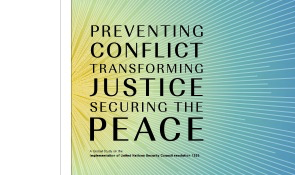. . WOMEN’S EQUALITY . .
From a study by UN Women
Foreward by Phumzile Mlambo-Ngcuka, UN Under-Secretary-General and Executive Director of UN Women
Resolution 1325 was one of the crowning achievements of the global women’s movement and one of the most inspired decisions of the United Nations Security Council. The recognition that peace is inextricably linked with gender equality and women’s leadership was a radical step for the highest body tasked with the maintenance of international peace and security. Turning the Security Council’s words into actions and real change has been a central pillar of UN Women’s work since the entity was created, and the driving passion of many other actors since the resolution was adopted as a global norm in 2000.

And yet there remains a crippling gap between the ambition of our commitments and actual political and financial support. We struggle to bridge the declared intent of international policymaking and the reality of domestic action in the many corners of the world where resolution 1325 is most needed.
UN Women was privileged to be tasked by the Secretary- General with helping to prepare this Global Study. We are grateful to its independent lead author, Ms. Radhika Coomaraswamy, her advisory board, and all the member States, academics, non-governmental organizations, and UN bodies that supported this effort. The preparation process involved consultations all over the world, the provision of ideas as well as technical inputs and information, and commentary on and review of drafts. We hope that this Study will stimulate discussion and be followed by concrete commitments, resources, political will, policy shifts, and accountability at all levels.
This Study reinforces the Security Council’s original crucial recognition of the power of engaging women in peace with compelling proof. It shows that women’s participation and inclusion makes humanitarian assistance more effective, strengthens the protection efforts of our peacekeepers, contributes to the conclusion of peace talks and the achievement of sustainable peace, accelerates economic recovery, and helps counter violent extremism. This Study, and a growing evidence base, make the implementation of resolution 1325 even more urgent and needed.
(Article continued in right column)
UN Resolution 1325, does it make a difference?
(Article continued from left column)
The Study adds two more important elements that will help us push this agenda forward. It compiles multiple examples of good practice that should become the standard requirement for all. In addition, it takes a hard look at implementation and enforcement, and the missing incentives and accountability measures that should nudge all actors into complying with these norms and living up to their promises. What emerges from these ideas is an explicit and ambitious roadmap for the way forward on women, peace and security. We have an enormous responsibility to ensure that the normative framework spurred by resolution 1325 is not just given periodic visibility and attention, but that it lies at the heart of the UN’s work on peace and security.
This year, we celebrate 15 years of resolution 1325 and 20 years since the Fourth World Conference on Women in Beijing. We have a new momentum towards the recognition of gender equality and women’s empowerment at the heart of sustainable progress for all, with the adoption of the 2030 Agenda for Sustainable Development. Many actors are coming to the table with new energy, new ideas, and new commitments, and we have seen other policy reviews, from our development goals to our peace operations and our peacebuilding architecture, emphasize the centrality of gender equality. This is an important opportunity to shape the way in which we address our global challenges in the next decades. Let us make the most of it.
(Thank you to Janet Hudgins, the CPNN reporter for this article.)